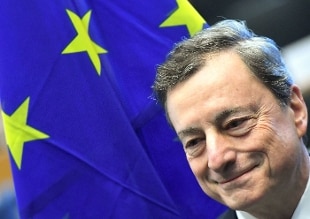Quirinale: "Appeal to the parties for a high profile government".
Draghi will be called to the Quirinale tomorrow
Share
February 02, 2021 Well-informed people reveal that he is so punctual that he has his watch on his wrist turned five minutes early, and that when in the course of his career he went to a summit or Eurogroup meeting, he loved to travel 'light' to the point of check in your baggage, albeit tiny, with the necessity of only one night in the hotel. His rigor, his authority, recognized even by the German "hawks", have created an ad hoc nickname, that of "Super Mario": this is because he saved the Eurozone, using the 'bazooka', with the determination of ' whatever it takes', and all the "arsenal" made available by the European Central Bank of which he was president for eight years.
Mario Draghi joined Eurotower in 2011, after a long career: among the various positions held, including that of Governor of the Bank of Italy. Born in 1947, married to Serena and two children, he landed at the top of the institute in Via Nazionale in 2006, succeeding the controversial predecessor Antonio Fazio.
He has also been Goldman Sachs Vice President for Europe since 2002. And before reaching prestigious positions (in 2006 president of the Financial Stability Forum, and between 1984 and 1990 executive director of the World Bank), he was a university professor for several years at various universities, including Venice and Florence. For ten years, from '91 to 2001, he was director general of the Treasury and from 1993 to 2001 president of the Committee for liberalization. In 1998, he contributed greatly to the consolidated finance act, which also bears his name (the Draghi law) and which implements a reform of the Italian financial system. And thanks to his reputation as an economist, Draghi is undoubtedly a prestigious 'name': just think that in 2012 he was named man of the year by the Financial Times. A recognition due to his ability to manage sovereign public debt, in the summer of nine years ago, preventing the financial crisis of the time from overwhelming large economies of the Eurozone such as the Spanish and Italian ones. As? Its 'bazooka' was represented by "Quantitative easing", a measure with which the European Central Bank undertook to purchase (from 22 January 2015 until September 2016) government bonds of the Eurozone countries for an equivalent value of 60 billion euros. Having saved the Euro, another obsession of his has long been growth. As recently as two months ago, he revealed in one of his very rare interviews that to stimulate recovery "you need a long look and high-yield projects".

